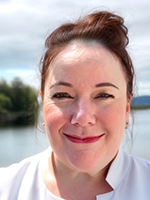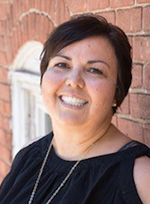AOSW Connections
Editorial Team
Editor-in-Chief
Amy Colver, MSSA, MA, LISW
AOSW Communications Director
Jeanice Hansen, LCSW, OSW-C
Managing Editor
Patricia Sullivan
Contribute Today!
To submit a story or information for inclusion in a future issue of AOSW Newsletter, contact Amy Colver or Melody Griffith on the list above.
Social Workers as Financial Navigators: A Match Often Overlooked
By Christina Bach, MBE, LCSW, OSW-C, FAOSW
and
Aimee Hoch, MSW, LSW, OSW-C
Financial toxicity is of paramount interest in oncology care in the U.S. As profits for insurers, health systems and pharmaceutical companies have increased, so has the burden of cost sharing, underinsurance and inflation for cancer survivors. While the Affordable Care Act aimed to control costs and provide access to insurance for more individuals, it also amplified the crisis of loss of income, high deductibles, copays and coinsurances, and the cost of oral oncology treatments to cancer patients and their families.
Addressing financial toxicity is a health equity issue that is aligned with the social work core value of social justice. Oncology social work financial navigators (OSWFN) are uniquely positioned to assess, intervene, evaluate and advocate for changes at micro, mezzo and macro levels. Yet very few of us actually embrace this important function and role in care for the whole patient.
OSWFNs establish relationships and trust with clients (another core value). When addressing often taboo or difficult subjects, we have great ability to exercise empathy and sensitivity without judgment. We bring a whole-person, trauma-informed approach to address inequity. Prior experiences, especially during childhood with poverty and lack of resources, often sets the stage for coping with financial challenges faced in adulthood.
We receive training in public benefits, programs and policies that impact our clients. These include SSI/SSDI, Medicare/Medicare, SNAP, FMLA, COBRA, ADA accommodations, Affordable Care Act, and most recently the Inflation Reduction Act and the ending of the COVID-19 public health emergency and its impact on Medicaid recipients.
We are resourceful. We maintain a vast knowledge of local, regional and national financial support resources that our clients can access. These include nonprofit grant funding/foundations, copay assistance, pharmaceutical assistance programs (PAPs), insurance premium assistance, and emergency financial support for practical, day-to-day expenses like transportation, lodging, food, child/elder/pet care, housing and utilities.
From diagnosis, through treatment and into survivorship, OSWFNs focus on healing financial toxicity while avoiding a band-aid, in-the-moment approach. This is a parallel process to treating the cancer. Care is individualized, focused on all out-of-pocket needs (not just medical), and structured towards true change for long-term financial health. We do this through validating the problem, normalizing the experience, linking with resources, insurance optimization, and ongoing navigation efforts as patient’s insurance and health status change.
Case Example
Suzy was diagnosed with lung cancer at the age of 55. She was working at the time of diagnosis but needed to stop working to undergo treatment. She is married, with adult children. Her husband also developed health problems and was on disability.
She is referred to the OSWFN for assistance with maintaining her insurance coverage. Upon assessment, the OSWFN also identified that loss of/change of household income could have a profound effect on Suzy’s options to maintain her health insurance and ultimately her ability to access care.
With the help of the OSWFN, she was able to access COBRA with premium assistance provided through a third-party foundation. However, the OSWFN knew that this premium assistance was time limited. She identified the need for longer-term options for maintaining health insurance. She then educated the patient through purchasing a plan through the Healthcare Marketplace as well as accessing a copay card from the manufacturer.
This intervention guaranteed full coverage and access to care for another year.
The OSWFN also provided education and support in applying for SSDI and two years into her disability, transitioning her coverage again to Medicare. This case demonstrates the need for flexibility, creativity and proactive interventions throughout a multi-year treatment plan.
Ultimately, these interventions lowered Suzy’s distress levels and kept her in care without interruption.
A Model of OSWFN
The Cancer Support Community Helpline (CSC-HL) has embraced the role of the OSWFN in its specialist services. As consultants, we receive referrals from community navigators and resource specialists from the csc-hl when financial needs are identified. The OSWFN then provides personalized financial navigation services. We provide services on an ongoing basis to provide continuity and manage changes that patients may experience at various times during their cancer experience. The CSC-HL has embraced the specialized training of the OSWFN in its approach to addressing financial toxicity.
These unique characteristics validate the connection between financial navigation and social work. All of these interventions improve access to care, adherence and potentially patient outcomes. We invite OSWs to embrace their skillset and consider the importance of addressing financial toxicity as part of psychosocial oncology best practices.
About the Authors

Christina Bach, MBE, LCSW, OSW-C, FASOW
Psychosocial Content Editor, Oncolink.org; Chair, Board of Oncology Social Work CertificationPhiladelphia, Pennsylvania
Christina.Bach@pennmedicine.upenn.edu
Christina Bach (she/her) holds her master’s degrees in social work and bioethics from the University of Pennsylvania and is a licensed clinical social worker. She is also a Certified Oncology Social Worker and a Fellow of the Association of Oncolo...
Read Full Author Bio

Christina Bach, MBE, LCSW, OSW-C, FASOW
Psychosocial Content Editor, Oncolink.org; Chair, Board of Oncology Social Work CertificationPhiladelphia, Pennsylvania
Christina.Bach@pennmedicine.upenn.edu
Christina Bach (she/her) holds her master’s degrees in social work and bioethics from the University of Pennsylvania and is a licensed clinical social worker. She is also a Certified Oncology Social Worker and a Fellow of the Association of Oncology Social Work. Christina is the Chair of the Board of Oncology Social Work Certification.
Christina’s practice is focused in oncology and health care social work. She has worked in inpatient and outpatient physical health and oncology settings and currently works as the Psychosocial Content Editor for OncoLink.org. Here her practice centers on curating accessible patient and caregiver education content in coping with cancer, cancer risk reduction, financial toxicity, and cancer survivorship. She also works closely with her team to research patient experience and outcomes. Currently she is studying the implementation of trauma informed care practices with radiation therapists at Penn Medicine. She also has a keen interest in the use of technology and social media in conveying patient narrative and experience with medical trauma.
Clinically, Christina works as a Financial Specialist with the Cancer Support Community and also facilitates the Philadelphia Multiple Myeloma Networking Group. Christina also has vast experience in Animal Assisted Therapy and works regularly with her certified therapy dogs, Linus, Huckleberry and Eugene (in training). Christina also lectures locally and nationally on the interplay between social work, bioethics and technology as well as the use animals in social work practice.
Articles
2017 Annual Conference: Denver, Here We Come!An Introduction to AI for Oncology Social Workers
Director's Report: Education
Director's Report: Education
Ethics SIG: A New Focus and a New Co-Chair
Ethics SIG: New Updates to the NASW Code of Ethics
Social Workers as Financial Navigators: A Match Often Overlooked
The Annual Conference from the View of a Presenter

Aimee Hoch, MSW, LSW, OSW-C
Oncology Financial Navigator, Grandview Health; Oncology Social Work Financial Navigator, Cancer Support Community HelplineAhoch@gvh.org
Aimee Hoch, LSW, OSW-C, is a Masters Level Social Worker with 20 plus years of experience in both healthcare and behavioral health. She earned her MSW from Fordham University Lincoln Center and is a licensed social worker. She is also a Certified ...
Read Full Author Bio

Aimee Hoch, MSW, LSW, OSW-C
Oncology Financial Navigator, Grandview Health; Oncology Social Work Financial Navigator, Cancer Support Community HelplineAhoch@gvh.org
Aimee Hoch, LSW, OSW-C, is a Masters Level Social Worker with 20 plus years of experience in both healthcare and behavioral health. She earned her MSW from Fordham University Lincoln Center and is a licensed social worker. She is also a Certified Oncology Social Worker. Aimee is a Financial Navigator for the Cancer Program at Grand View Health where she created and implemented the Financial Navigation program in 2018.
Aimee is a consultant for the Cancer Support Community Helpline as a Financial Navigation Specialist. She is an active member of the Association of Community Cancer Center’s (ACCC) Financial Advocacy Network Advisory Committee and Voice Task Force. She speaks about Financial Toxicity and the role of Financial Navigation in cancer care. Aimee has been a guest on Cancer Buzz TV and Patient Power. She has contributed to publications for Breastcancer.org, Oncolink News, Patient Power, and ACCC’s Patient Assistance and Reimbursement Guide.
Articles
Social Workers as Financial Navigators: A Match Often Overlooked